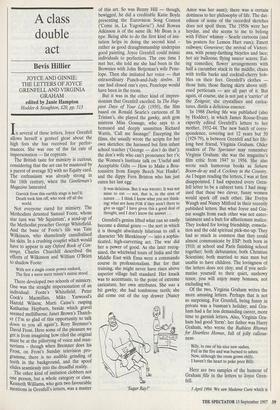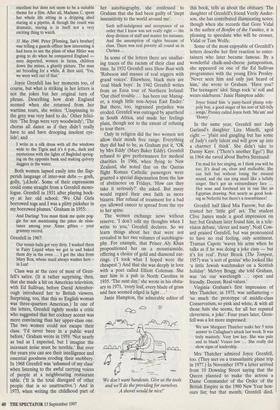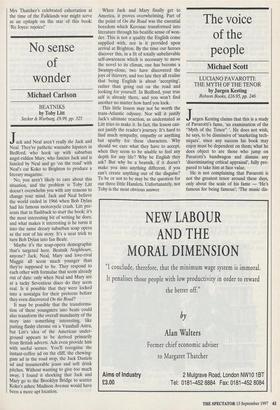A class double act
Bevis Hillier
JOYCE AND GINNIE: THE LETTERS OF JOYCE GRENFELL AND VIRGINIA GRAHAM edited by Janie Hampton Hodder & Stoughton, £20, pp. 513 In several of these letters, Joyce Grenfell allows herself a genteel gloat about the high fees she has received for perfor- mances. She was one of the fat cats of impersonation — fat copycats. The British taste for mimicry is curious, considering that the art can be mastered by a parrot of average IQ with no Equity card. The enthusiasm was already strong in the 18th century, when the Gentleman's Magazine lamented
Garrick from this earthly stage is hurl'd; Death took him off, who took off all the world.
Not everyone cared for mimicry. The Methodists detested Samuel Foote, whose star turn was 'Mr Squintum', a send-up of the Methodist preacher George Whitefield. And the bane of Foote's life was Tate Wilkinson, who shamelessly cannibalised his skits. In a crushing couplet which would have to appear in any Oxford Book of Con- tempt, Charles Churchill described the efforts of Wilkinson and William O'Brien to shadow Foote:
With not a single comic power endued, The first a mere mere mimic's mimic stood.
There developed two schools of mimicry. One was the straight impersonation of an individual: Foote's Whitefield; Peter Cook's Macmillan, Mike Yarwood's Harold Wilson; Marti Caine's rasping Katharine Hepburn, beside which gravel seemed mellifluous; Janet Brown's Thatch- er (I'm so glad of this opportunity to talk down to you all again'); Rory Bremner's David Frost. Here some of the pleasure we get is from imagining how riled the original must be at the pillorying of voice and man- nerisms – though when Bremner does his Frost, on Frost's Sunday television pro- gramme, there is no audible grinding of teeth in the background, and the spoof elides seamlessly into the dreadful reality. The other kind of imitation clobbers not one person, but a whole category or class. Kenneth Williams, who gets two favourable mentions in Grenfell's letters, was a master of this art. So was Benny Hill — though, bewigged, he did a creditable Katie Boyle presenting the Eurovision Song Contest (`Come in, La Yugoslavie!') And Rowan Atkinson is of the same ilk: Mr Bean is a type. Being able to do the first kind of imi- tation helps in doing the second kind rather as good draughtsmanship underpins good painting. Joyce Grenfell could mimic individuals to perfection. The one time I met her, she told me she had been in the Brownies with John Betjeman's wife Pene- lope. Then she imitated her voice — that extraordinary Punch-and-Judy timbre. If one had closed one's eyes, Penelope would have been in the room.
But it was in the other kind of impres- sionism that Grenfell excelled. In The Hap- piest Days of Your Life (1950), the film based on Ronald Searle's cartoons of St Trinian's, she played the gawky, arch gym mistress Miss Gossage, who says to a bemused and deeply unsmitten Richard Wattis, 'Call me Sausage!' Excepting the films, she usually wrote the scripts for her own sketches: the harassed but firm infant school teacher (`George — don't do that'); the don's wife who can't pronounce her r's; the Women's Institute talk on 'Useful and Acceptable Gifts — How to Make a Bou- tonnière from Empty Beech Nut Husks'; and the dippy Fern Brixton who has just eaten her last egg: It was delicious. But it was WRONG. It was not mine to eat — not, that is, in the eyes of nature ... I think I know what you are think- ing: what are hens FOR if they aren't there to give us eggs? I have given this a good deal of thought, and I don't know the answer ...
Grenfell's genius lifted what can so easily become a dismal genre — the sort in which it is thought absolutely hilarious to call a character 'Mr Blenkinsop' — into a sophis- ticated, high-curvetting act. The war did her a power of good. As she later recog- nised, the whirlwind tours of India and the Middle East with Ensa were a commando course in professionalism. But for that training, she might never have risen above superior village hall standard. Her knack was to accentuate, to the point of extreme caricature, her own attributes. She was a bit gawky; she had tombstone teeth; she did come out of the top drawer (Nancy Sugar Ray?' Astor was her aunt); there was a certain dottiness to her philosophy of life. The dat- edness of some of the recorded sketches does not spoil them. The 1950s were her heyday, and she seems to me to belong with Fifties' whimsy – Searle cartoons (and his posters for Lemon Hart rum); Emett railways; Genevieve; the revival of Victori- ana, with penny-farthing bicycles and lace; hot air balloons; flying saucer scares; Eal- ing comedies; flower arrangements with half a cucumber stuck in the middle; chairs with trellis backs and cocktail-cherry bob- bles on their feet. Grenfell's clothes those hats, those flaring skirts above stiff- ened petticoats — are all part of it. But again, of course, she is not just a 'carrier' of the Zeitgeist; she crystallises and carica- tures, distils a delicious essence.
In 1988 Darling Ma was published (also by Hodder), in which James Roose-Evans expertly edited Grenfell's letters to her mother, 1932-44. The new batch of corre- spondence, covering not 12 years but 50 (1929-79), is between Grenfell and her life- long best friend, Virginia Graham. Older readers of The Spectator may remember Virginia Graham: she was the magazine's film critic from 1947 to 1956. She also wrote such humorous books as Sahara Boom-de-ay and A Cockney in the Country. As I began reading the letters, I was at first disappointed. I had expected every Gren- fell letter to be a cabaret turn. I had imag- ined that these two clever, funny women would spark off each other, like Evelyn Waugh and Nancy Mitford in their recently published letters. But what Joyce and Gin- nie sought from each other was not enter- tainment and a butt for affectionate malice. They looked for loving friendship, consola- tion and the odd spiritual pick-me-up. They had so much in common that they could almost communicate by ESP: both born in 1910; at school and Paris finishing school together; both debutantes; both Christian Scientists; both married to nice men but unable to have children. The lovingness of the letters does not cloy; and if you accli- matise yourself to their quiet, unshowy tenor, you will enjoy many bonuses, not excluding wit.
Of the two, Virginia Graham writes the more amusing letters. Perhaps that is not so surprising. For Grenfell, being funny in private was a busman's holiday; and Gra- ham had a far less demanding career, more time to garnish letters. Also, Virginia Gra- ham had good 'form': her father was Harry Graham, who wrote the Ruthless Rhymes for Heartless Homes, full of jolly callous- ness:
Billy, in one of his nice new sashes, Fell in the fire and was burned to ashes; Now, although the room grows chilly, I haven't the heart to poke poor Billy.
Here are two samples of the humour of Graham fille in the letters to Joyce Gren- fell.
3 April 1994. We saw Madame Curie which is excellent but does not seem to be a suitable theme for a film. After all, Madame C. spent her whole life sitting in a dripping shed staring at a pipette, & though the result was dramatic, staring is in itself not a very exciting thing to watch.
31 May 1946. Peter [Fleming, Ian's brother] was telling a guards officer how interesting it had been to see the plans of what Hitler was going to do when he conquered England men deported, women in farms, children down the mines, a ghastly picture. The man sat brooding for a while, & then said, 'Yes, we were well out of that.'
Joyce Grenfell has her moments too, of course, but what is striking in her letters is not the jokes but her original turn of phrase. Describing how drab England seemed when she returned from her wartime tours, she writes: `Unspinning to the grey was very hard to do.' Other felici- ties: 'The frogs were very woodwindy'; 'The chorus all dance as if they didn't really have to and have drooping insolent eye- lids'; and
I write in a silk dress with all the windows wide to the Tigris and it's 6 p.m., dark and mysterious with the lights of Baghdad spring- ing on the opposite bank and making quivery daggers in the water.
Both women lapsed easily into the flap- perish language of inter-war debs — gosh, golly, `j.d.hols'. Some of their expressions could come straight from a Grenfell mono- logue. Grenfell in 1931 after playing hock- ey at her old school: 'We Old Girls borrowed togs and I was a plitty picksher in my borrowed plumes.' Graham in 1955:
And Darling! You must think me quite peg- gle for not mentioning the piece de resis- tance among your Xmas gifties – your grammy record.
Grenfell in 1967: Our tennis balls got very dirty. I washed them in Fairy Liquid when we got in and baked them dry in the oven ... I got the idea from Mary Rox, whose maid always washes hers in Lux!
Class was at the core of most of Gren- fell's satire. (It is rather surprising, then, that she made a hit on American television, with Ed Sullivan, before David Attenbor- ough introduced her to British viewers. Surprising, too, that this so English woman was three-quarters American.) In one of the letters, Grenfell rightly mocks a critic who suggested that her cockney accent was more convincing than her upper-class one. The two women could not escape their class. 'I'd never been in a public ward before,' Graham wrote in 1959. Not nearly as bad as I expected, but I imagine the incessant noise must be terrible.' But over the years you can see their intelligence and essential goodness eroding their snobbery. In 1968 Grenfell was 'ashamed of my class' when listening to the awful carrying voices of people at a neighbouring restaurant table. (`It is the total disregard of other people that is so unattractive.') And in 1973, when writing the childhood part of her autobiography, she confessed to Graham that she had been guilty of 'inept insensitivity to the world around me'.
Such self-indulgence and acceptance of an order that I knew was not really right — the deep division of staff and master for instance. And the assumption of rights because of class. There was real poverty all round us in Chelsea ...
In some of the letters there are unallur- ing traces of the racism of their class and time. In 1932 Grenfell sees Show Boat with `Robeson and masses of real niggers with grand voices'. Elsewhere, black men are `coal black boys'. In 1942 Grenfell writes from an Ensa tour of Northern Ireland: `Our chief trouble ... has been our Manag- er, a tough little non-Aryan East Ender.' But there, too, ingrained prejudice was eroded. Grenfell was outraged by apartheid in South Africa, and made her feelings plain, though not to the extent of refusing to tour there.
Only in religion did the two women not allow their minds free range. Everything they did had to be, as Graham put it, 'OK by Mrs Eddy' (Mary Baker Eddy). Grenfell refused to give performances for medical charities. In 1966, when flying to New Zealand, she noted that on the Qantas flight Roman Catholic passengers were granted a special dispensation from the law of abstinence on Fridays. 'How can they take it seriously?' she asked. But many would regard their own faith as more bizarre. Her refusal of treatment for a bad eye allowed cancer to spread from the eye to her spine.
The women exchange news without reserve. 'I don't edit my thoughts when I write to you,' Grenfell declares. So we learn things about her that were not revealed in her two volumes of autobiogra- phy. For example, that Prince My Khan propositioned her on a mountainside, offering a choice of gold and diamond ear- rings. CI took what I hoped were the cheapest.') And that she was deeply in love with a poet called Elliott Coleman. She met him in a pub in North Carolina in 1935. 'The next day,' she wrote in his obitu- ary in 1971, 'every leaf, every blade of grass and face seemed edged in light ... '
Janie Hampton, the admirable editor of `We don't want handouts. Give us the tools and we'll do the providing for ourselves. A shovel would be nice!' this book, tells us about the obituary. The daughter of Grenfell's friend Verily Ander- son, she has contributed illuminating notes; though when she records that Gore Vidal is the author of Bonfire of the Vanities, it is pleasing to speculate who will be crosser, Vidal or Tom Wolfe.
Some of the most enjoyable of Grenfell's letters describe her first reaction to enter- tainers who later became famous. By a wonderful chalk-and-cheese juxtaposition, she appeared on one of the Ed Sullivan programmes with the young Elvis Presley. `Never seen him and only just heard of him,' she wrote to Graham. 'Have you? The teenagers' idol. Sings rock 'n' roll and wears sideburns.' Janie Hampton adds: Joyce found him 'a pasty-faced plump roly- poly boy, a good singer of his sort of hill-billy songs.' Presley called Joyce both 'Ma'am' and `Honey'.
In the same year, Grenfell met Judy Garland's daughter Liza Minelli, aged eight — 'plain and gangling but has some of Judy's early talent and will grow up into a charmer I think'. She didn't take to Danny Kaye. (`There's another Ego!') But in 1964 she raved about Barbra Streisand: I'm mad for her singing, as I think you will be too. It's dead on, clear and malleable. She can belt but without losing the musical sound, and she can sing small like a lullaby singer. She's got an extraordinary face ... Her nose and forehead are in one like an Egyptian drawing. Not nearly as good look- ing as Nefertiti but there's a resemblance!
Grenfell half liked Mia Farrow, but dis- trusted her 'little girl' act. The student Clive James made a good impression on her; but Graham later found him, in a tele- vision debate, 'clever and nasty'. Noel Cow- ard praised Grenfell, but was pronounced to have no real feeling, only sentiment. Truman Capote 'waves his arms when he talks as if he was doing a joke cissy — but it's for real'. Peter Brook (The Tempest, 1957) was 'a sort of genius' who looked like 'a little Jewish watchmaker on a Scottish holiday'. Melvyn Bragg, she told Graham, was 'on our wavelength ... open and friendly. Decent. Real values.'
Virginia Graham's first impression of Mrs Thatcher, in 1975, was unflattering `so much the prototype of middle-class Conservatism, so pink and white, & with all those hats she seems, for all her reputed cleverness, a joke'. Four years later, Gren- fell was a lot more impressed: We saw Margaret Thatcher make her 5 mins answer to Callaghan's attack last week. It was truly masterly. Very low key. She was pale and in black! Voices low ... She really did show signs of leadership.
Mrs Thatcher admired Joyce Grenfell, too. (They met on a transatlantic plane trip in 1977.) In November 1979 a letter arrived from 10 Downing Street saying that the Queen planned to make the actress a Dame Commander of the Order of the British Empire in the 1980 New Year hon- ours list; but that month, Grenfell died. Mrs Thatcher's celebrated exhortation at the time of the Falklands war might serve as an epitaph on the star of this book: `Re Joyce: rejoice!'




































































 Previous page
Previous page